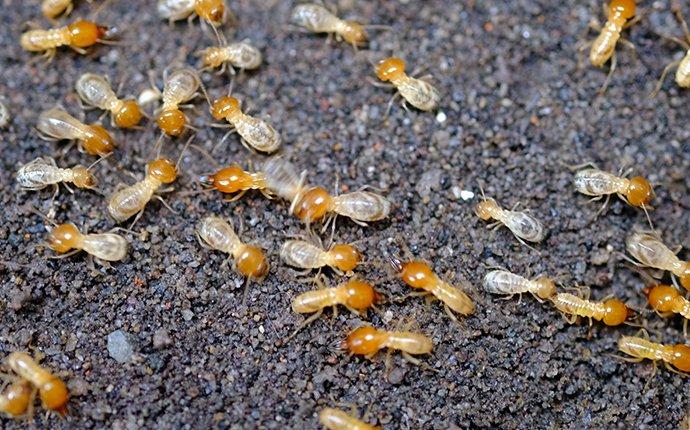Advanced Termite Control: Proven Methods for Removing Termite Infestations
Advanced Termite Control: Proven Methods for Removing Termite Infestations
Blog Article
Environmental Effect of Parasite Control: Harmonizing Efficiency With Sustainability
The environmental effect of parasite control is a vital problem that needs a delicate equilibrium between attaining efficiency in ensuring and taking care of bugs sustainability of our ecological communities. From the use of harmful chemicals that seep right into our soil and water to the unintentional effects on non-target types, the effects of conventional parasite control techniques are significant.
Harmful Chemicals in Insect Control
The application of harmful chemicals in pest control presents significant ecological and health risks that call for mindful consideration and mitigation techniques. Pesticides, herbicides, and chemicals are typically utilized to eradicate insects, yet their widespread application can lead to unexpected consequences. These chemicals can infect soil, water sources, and the air, influencing not only the targeted bugs however additionally helpful insects, wildlife, and human beings.

To attend to these risks, incorporated pest management (IPM) methods are being promoted as a more lasting choice. IPM entails a combination of techniques such as organic control, habitat control, and the targeted use pesticides as a last hotel (ant control waxhaw nc). By adopting an alternative technique to pest control, we can minimize the ecological and health impacts linked with harmful chemicals while successfully taking care of pest populations
Effect On Non-Target Variety
Thinking about the unintended effects of pest control methods, the effect on non-target species is an essential aspect that requires complete analysis. While pest control actions intend to target certain pests, various other organisms in the ecological community may be unintentionally influenced. Non-target species, consisting of useful bugs, birds, animals, and also plants, can suffer direct or indirect harm from pesticide applications or biological control methods.
Pesticides can have dangerous or sub-lethal impacts on non-target species. Pesticides made to battle a specific insect bug may damage pollinators like or all-natural killers such as ladybugs. Additionally, chemical residues can collect in the setting, influencing non-target microorganisms with time. In a similar way, organic control agents, otherwise species-specific, can pose dangers to unexpected targets, interrupting the ecological balance.
To reduce the impact on non-target species, integrated bug administration (IPM) strategies that highlight an all natural approach to pest control are recommended. These methods focus on using eco-friendly techniques, decreasing damage to beneficial microorganisms while properly taking care of pest populaces. Carrying out comprehensive threat evaluations and keeping an eye on the results of parasite control efforts are vital actions in safeguarding non-target varieties and promoting overall ecosystem health.
Dirt and Water Contamination
Unintended environmental consequences of insect control approaches extend beyond impacting non-target types, with significant ramifications for soil and water contamination. Chemicals, herbicides, and chemical fertilizers utilized in pest control can seep right into the soil and contaminate groundwater, presenting a danger to both terrestrial and aquatic environments. Soil contamination can disrupt the balance of bacteria crucial for nutrition cycling and plant development, leading to reduced dirt fertility and efficiency. Additionally, these chemicals can linger in the atmosphere for extended go to my blog durations, collecting in the soil and possibly going into the food cycle.
Water contamination is one more crucial concern linked with bug control techniques. To minimize soil and water contamination from pest control tasks, incorporated pest administration techniques that prioritize sustainability and reduce chemical inputs are vital.
Air Contamination From Pesticide Usage
Exposure to air-borne chemicals throughout agricultural applications poses a substantial worry for air contamination control measures. Additionally, chemical drift, where chemicals are carried by the wind to unplanned locations, can lead to the contamination of nearby ecosystems and water bodies.

Techniques for Lasting Parasite Control
In the world of farming techniques, implementing sustainable parasite control strategies is vital for keeping ecological balance and safeguarding crop returns. Lasting pest control highlights the use of eco-friendly techniques to manage insect populaces effectively while reducing harm to non-target organisms and environments. Integrated Bug Management (IPM) is a commonly embraced technique that integrates organic, social, physical, and chemical control methods to accomplish lasting insect monitoring services.
One key approach in sustainable parasite control is promoting biodiversity within agroecosystems. By enhancing all-natural enemies of insects, such as predators and parasitoids, farmers can minimize the requirement for artificial pesticides. Plant rotation and diversity are also reliable strategies to interrupt pest life process and produce much less favorable problems for insects to thrive. In addition, making use of pest-resistant plant ranges and employing methods like catch cropping can assist minimize bug stress without relying greatly on chemical interventions. Ultimately, by integrating these lasting parasite control techniques, farmers can attain a balance in between pest administration effectiveness and environmental stewardship.
Verdict
To conclude, the ecological effect of bug control approaches should be carefully thought about to balance performance with sustainability. Harmful chemicals used in bug control can lead to dirt and water contamination, air pollution, and damage non-target types - termite control. It is crucial to carry out sustainable pest control techniques to decrease these adverse results on the atmosphere and advertise a healthier environment for future generations
By embracing an all natural technique to pest control, we can reduce the environmental and health influences linked with harmful chemicals while properly taking care of pest populaces.

To mitigate the air contamination triggered by chemical use, it is vital to adopt incorporated pest administration approaches that prioritize the usage of non-chemical bug control approaches, such as crop rotation, all-natural predators, and resistant plant ranges. Lasting insect control highlights the use of ecologically pleasant techniques to take care of pest populations successfully while lessening damage to non-target organisms and communities. Integrated Bug Monitoring (IPM) is a widely embraced technique that combines biological, cultural, physical, and chemical control approaches to achieve lasting insect management remedies.
Report this page